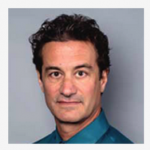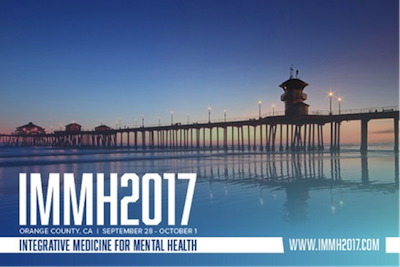The Integrative Medicine for Mental Health Conference 2017 (IMMH) runs Sept 28-Oct 1, 2017, in Orange County, CA (near Anaheim).
This is a conference I attend every year and I’ll be attending again this year – it’s that good! As IMMH mentions:
research has revealed that many disorders such as depression, bipolar disorder, anxiety, OCD, eating disorders, and autism spectrum disorders often have biomedical causes that contribute to symptoms, from nutritional deficiencies to chronic infections.
This is a practitioner-only event and attendees include psychiatrists, naturopathic physicians, family physicians, chiropractic physicians, nurses and nurse practitioners, psychologists, nutritionists and registered dieticians, and other allied mental health professionals.
Here is a video with highlights from the 2016 conference
Here are just a few of the topics and speakers I am especially looking forwarding at the 2017 conference:
Integrative Medicine Approaches to Autoimmune Encephalopathy and PANDAS – KENNETH BOCK, MD

This lecture will discuss neuropsychiatric disorders with abrupt onset that include symptoms ranging from anxiety to intrusive thoughts and rage episodes. They may also include tics, dysgraphia (inability to write coherently), and dyscalculia (difficulty understanding numbers). These symptoms are triggered by infectious autoimmune encephalopathy (frequently referred to as PANS/PANDAS). Evaluation and treatment will be discussed from a comprehensive integrative medicine point of view.
Ion Channel Genetics in Mental Health: Associated Integrative Therapies – LAUREN FEW, PHD

Several studies have implicated genetic mutations in voltage-gated ion channels in the pathogenesis of mental health disorders. For example, both the CACNA1C calcium channel gene and ANK3 gene have been linked to bipolar disorder, schizophrenia, and depression in genome-wide association studies. This talk will focus on a number of integrative therapeutic options that target ion channels and have demonstrated efficacy in the treatment of mental health symptomatology, including omega-3 fatty acids, lithium, magnesium, and N-acetylcysteine.
Mold and Mycotoxins: The Hidden Menace – MARK FILIDEI, DO

Mold and fungi are ubiquitous in the environment. However, particularly in “WDB”, water damaged buildings, mold can become a sinister force affecting physical and mental health. Not all molds are toxic and many just cause respiratory issues, but a subset of molds produce mycotoxins; powerful neurotoxins that can have a profound effect on the brain and mental health. The effects of mold, as well as testing, diagnosis, and treatment options will be discussed.
Mitochondria and Mood: Understanding the Role of Mitochondrial Dysfunction in Psychiatric Illness – PETER BONGIORNO, ND

As the ‘powerhouse of the cell’ and nervous system, healthy mitochondrial function is an underlying key to healing mental illness. Dr. Bongiorno will explain what you need to know to help identify mitochondrial issues, understand the factors that contribute to poor function, and review the best natural treatments to restore mitochondrial health.
Helping Patients Follow Special Diets Despite Barriers – JULIE MATTHEWS, CNC

How do we support effective special diet implementation when our patients – both adults and children – face varied behavior, psychosocial, and environmental barriers? How do you determine the right diet for each individual? If it’s too complex or restrictive the patient may become overwhelmed and non-compliant. If it’s too basic, you may not see positive results. In this presentation, Julie will share keen insights gleaned from fifteen years of working with special diets for complex digestive, immune, and neurological conditions in both children and adults, audiences fraught with implementation challenges.
Discovery of a Novel Cause of Alzheimer’s Disease – DALE BREDESEN, MD

The cause(s) of Alzheimer’s disease have remained incompletely defined, although risk factors such as type 2 diabetes and the epsilon-4 allele of the Apolipoprotein E gene (ApoE4) have been described. Precision medicine approaches have proven valuable for the evaluation and treatment of various malignancies. This presentation will review the metabolic profiling done by Dr. Bredesen and his team in patients with Alzheimer’s disease and pre-dementia conditions. The results suggested that mycotoxin exposure may be a novel cause of Alzheimer’s disease.
Genetic SNP Testing for Neuropsychiatric Disorders – WILLIAM SHAW, PHD

Genetic variants called single nucleotide polymorphisms (SNPs) play a greater role in the metabolism of the human brain compared to almost all the other organs. A SNP called apolipoprotein E4 markedly increases the chance of developing Alzheimer’s disease after 50. A SNP in protein HFe that absorbs iron improves brain function in populations that have dietary iron deficiency but greatly increases the risk of psychiatric disease in populations in which dietary iron is excessive. In this presentation, a survey of the most significant SNPs for psychiatric diseases and potential “fixes” for these SNPs will be reviewed.
Estrogen and Mental Health: Exploring Estrogen’s Vital Role Linking the Brain, the Gut Microbiome, and the Immune System – FELICE GERSH, MD

There is an amazing and complex interrelationship involving our gut microbiome, our brain function and emotional wellbeing, and our hormones, and most particularly estrogen. A dialogue has only recently been re-initiated, opening the door to a deeper exploration of the most advantageous ways and manner in which to deliver estrogen supplementation for the improvement and prevention of cognitive and mood disorders. This talk will review how this dialogue is unfolding and using this new information, provide practical ways to address mental health issues.
Botanicals for Depression: Rhodiola, St. John’s Wort, Curcumin and Saffron – JUDITH PENTZ, MD

Botanicals have long been a part of the healing traditions in many cultures for depression. Certain medicinal herbs have increasing evidence based research and thus can be part of toolbox for an integrative medical practice. Yet, having a greater understanding of the complexities that herbs present is critical in having a successful outcome when prescribing them for your patients.
Here is the entire schedule and all the topic outlines
And here is the link to register
This is a practitioner-only event and CEs and CMEs are available.
Hope to see you there! I’m not presenting again this year (as you saw in the video I did present last year) but will be there to support my dear friend and colleague Julie Matthews AND will also have a booth there to share The Antianxiety Food Solution message!
If there is enough interest I’m going to arrange a small group meet-up with Julie and I and some of the speakers so please let me know in the comments below if this is of interest.
P.S. If you are NOT a practitioner and are interested please pass this on to your doctor, nutritionist, social worker, therapist, naturopath etc. The event is also recorded and will be available to purchase after wards so please leave me a note in the comments if you’re interested in the recordings.
